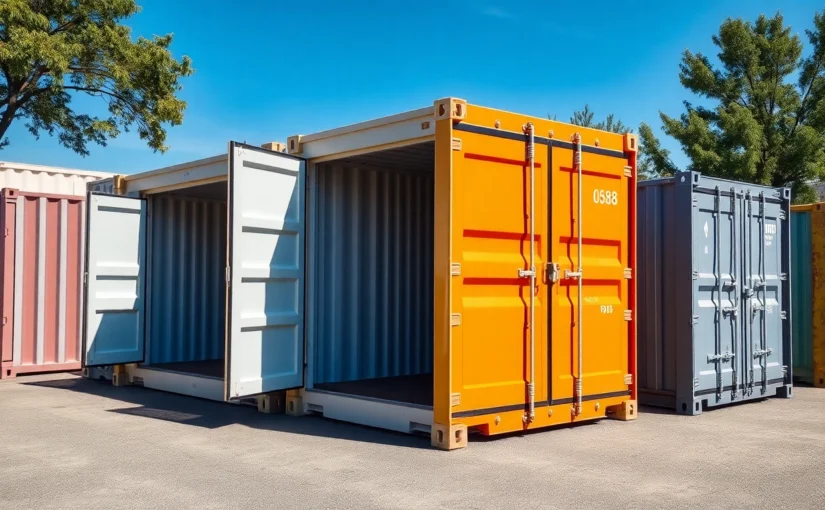Understanding Container Rental in the UK
In an increasingly complex logistics and storage landscape, container rental has become an essential solution for businesses, construction projects, and individuals seeking flexible, secure, and cost-effective storage or transportation options. Whether it’s for temporary storage at a construction site, long-term warehousing, or mobile offices, container rental services in the UK offer diverse solutions tailored to a wide range of needs. As the demand grows, so does the variety of container types, rental terms, and service providers, making it imperative for prospective renters to understand the intricacies involved.
For those venturing into container rental for the first time, understanding the fundamentals can significantly influence overall project efficiency and budget management. This comprehensive guide aims to demystify the essential aspects of container rental within the UK, highlighting best practices, key considerations, and emerging trends to help you make informed decisions.
Types of Containers Available for Hire
The UK market offers a broad array of container types, each engineered to meet specific industrial, commercial, or personal requirements. Selecting the correct container hinges on understanding these variations, their features, and optimal use cases.
Standard Shipping Containers
Standard shipping containers are the most prevalent and versatile option. Typically made of steel, these containers are designed for durability and security, making them suitable for both storage and transportation. Sizes predominantly range from 10ft to 45ft in length, with 20ft and 40ft being the most common. These containers are ideally suited for bulk goods, machinery, and general equipment that require robust containment.
High Cube Containers
High cube containers are similar to standard ones but feature an extra foot in height, providing additional volume and flexibility for taller goods or bulky items. They are popular for moving large, lightweight cargo or creating mobile offices and temporary workspaces.
Open-Top Containers
Designed for oversized cargo or items that cannot be easily loaded through doors, open-top containers have a removable roof, facilitating easy loading from above. These are highly useful for construction materials, heavy machinery, or debris.
Flat Rack and Platform Containers
When transporting or storing large or irregularly shaped items, flat rack containers provide a flexible solution. They are ideal for machinery, pipes, or equipment that need more space and ease of access.
Specialized Containers
These include refrigerated containers for temperature-sensitive goods, tank containers for liquids, and secure, lockable storage units. Many providers also offer customized solutions such as converted containers for storage offices, workshops, or even retail outlets.
Funding a project or operation requires matching your specific needs with the correct container type to optimize efficiency and cost.
How Container Rental Fits Different Industry Needs
Container rental’s flexibility and scalability make it an indispensable resource across a multitude of industries. Its applications are as diverse as the industries themselves, tailoring solutions that enhance operational efficiency and security.
Construction and Infrastructure
Construction sites often require temporary storage of materials, tools, and machinery. Containers provide secure, weatherproof options that help streamline logistics, reduce theft, and facilitate on-site organization. Moreover, converted containers serve as construction site offices, staff accommodations, or facilities for safety briefings and meetings.
Manufacturing and Warehousing
For manufacturing plants, container rental supports expanded storage capacity without permanent capital investment. Temporary or long-term containers can accommodate excess inventory, raw materials, or finished goods, especially during peak production periods or seasonal fluctuations.
Retail and Events
Retailers and event organizers leverage containers for pop-up shops, mobile offices, and storage of equipment or stock. With flexible rental terms, this approach minimizes costs while maximizing logistical adaptability.
Shipping and Logistics
In shipping and freight forwarding, containers are the backbone of international trade. Rental options enable shipping companies and importers/exporters to access reliable, compliant units without the need for extensive ownership logistics.
Agriculture and Rural Projects
For farms and rural developments, containers offer durable storage for machinery, feed, and equipment, protecting assets from weather and theft. Custom configurations also support mobile processing units or onsite workshops.
The adaptability of container rental solutions allows industries to respond swiftly to changing operational demands, facilitating scalability and cost control.
Cost Considerations and Budget Planning for Container Rental
Budgeting effectively for container rental involves understanding various cost components, rental models, and potential hidden fees. Transparent cost analysis is crucial for optimizing expenditure and ensuring project feasibility.
Rental Rates and Pricing Models
Typically, rental costs depend on container size, duration, and delivery logistics. For instance, compact 10ft containers generally start at around £50-£80 per month, while standard 20ft units may range from £60-£120 per month. Longer rentals often benefit from discounted rates per week or month.
Some providers, like Boxrent Limited, offer competitive rates, often under £60 monthly for 20ft containers. Delivery and pickup costs are additional but can vary widely based on distance, access difficulty, and size.
Additional Costs to Anticipate
- Delivery and Pickup Fees: Usually calculated based on distance and access complexity.
- Security Deposits: Some providers require a refundable deposit as a security measure.
- Site Preparation: Ensuring firm ground and suitable access can incur costs if additional groundwork is needed.
- Accessories and Customization: Lockboxes, shelving, ventilation, or climate control can add to expenses.
Cost Optimization Tips
- Compare multiple quotes from reputable providers.
- Negotiate rental durations and delivery terms for discounts.
- Assess the necessity of additional features to avoid unnecessary charges.
- Plan ahead to minimize delivery costs by scheduling pickups and drops efficiently.
Effective budget planning not only saves money but also ensures that the chosen container solution aligns with operational needs, avoiding overspending on features or services that aren’t essential.
Choosing the Right Container Rental Service
Selecting a reliable container rental provider is critical to securing quality units, fair pricing, and support throughout the rental period. Not all providers are equal; therefore, thorough evaluation based on key features and service quality is paramount.
Key Features to Look for in a Container Rental Provider
- Variety of Container Options: A broad selection offers tailored solutions.
- Quality and Condition: New or well-maintained used containers ensure durability and security.
- Flexible Rental Terms: Options for short-term, long-term, and lease-to-own arrangements.
- Delivery and Collection Services: Efficient logistics support reduces hassle.
- Customizations and Accessories: Ability to tailor containers for specific use cases.
- Customer Support and After-Sales Service: Prompt assistance and maintenance support are vital for peace of mind.
Evaluating Rental Terms, Delivery, and Support
When comparing providers, examine their rental agreements carefully. Key points include:
- Pricing transparency and clarity on additional charges.
- Exact delivery timelines and flexibility for urgent needs.
- Availability of emergency support or repairs.
- Clear policies on damages, security, and insurance.
- Options for extensions or early termination.
Reviews and testimonials from previous clients can offer insights into reliability and customer satisfaction, helping you select a provider that can uphold service promises.
Customer Testimonials and Case Studies
Real-world examples illustrate the benefits and challenges of container rental arrangements. For instance, a UK construction firm reported reducing on-site thefts by 40% after switching to a provider offering secure, lockable containers with 24/7 support. Similarly, a logistics company improved delivery turnaround times by partnering with a provider that offered rapid deployment and flexible rental terms.
Such testimonials and case studies underscore the importance of partnering with experienced, customer-centric providers for optimal outcomes.
Best Practices for Efficient Container Rental
To maximize the benefits of your container rental investment, adhere to best practices covering site preparation, rental management, and container security.
Preparing Your Site for Container Delivery
Ensuring your site is ready minimizes delays and additional costs. Key steps include:
- Identifying a level, stable, and accessible location for placement.
- Obtaining necessary permits and clearance with local authorities.
- Clearance of obstructions such as trees, overhead wires, or uneven ground.
- Planning access routes to accommodate delivery vehicles.
Working closely with your provider during this stage guarantees smooth delivery and positioning.
Managing Rentals for Short and Long-Term Needs
Flexibility is key to cost-effective container rental. For short-term projects, align rental periods precisely with project timelines, avoiding unnecessary extensions. Conversely, if your needs are ongoing, negotiate long-term rental agreements for discounted rates.
Regularly inspect containers during the rental period to ensure they remain in good condition and meet your security standards.
Ensuring Security and Maintenance of Rented Containers
Security should be a top priority. Use high-quality lock mechanisms, restrict access with key codes or PINs, and consider adding CCTV surveillance if required. Routine checks help identify issues such as rust, leaks, or damage early, enabling prompt repairs to preserve functionality and security.
Innovations and Trends in Container Rental
The container rental industry is continually evolving, integrating new technologies and design approaches to meet modern demands. Staying informed about these trends can give your projects a competitive advantage.
New Container Designs and Customization Options
Modern containers feature modular designs that can be easily customized with insulation, climate control, shelving, or windows. Industry-specific modifications—such as converted containers for offices, cafes, or retail shops—are increasingly popular, offering versatile, turn-key solutions.
Integrating Technology for Better Management
Innovations like container tracking systems, RFID tags, and remote monitoring enable real-time inventory management, security oversight, and maintenance alerts. Digital platforms streamline booking, scheduling, and billing processes, enhancing transparency and efficiency.
Future Outlook for Container Rental Market in the UK
Anticipated growth driven by infrastructure development, renewable energy projects, and urbanization points to a robust future. Sustainable practices, such as using recycled containers and eco-friendly materials, are also shaping the market. Furthermore, automation and remote management solutions are expected to become industry standards, further improving client experience and operational efficiency.
How to Get Started with Container Rental
Taking the first step involves clear assessment, thorough research, and strategic planning. This section offers a structured approach to beginning your rental process confidently.
Assessing Your Storage or Logistics Requirements
Start by analyzing what you need the container for: What volume of storage is necessary? Will the container be used long-term or for a short project? Do you require special features such as refrigeration or climate control? Answering these questions helps define your specifications and budget.
Requesting Quotes and Comparing Providers
Contact multiple providers or visit their online portals to gather detailed quotes. Ensure each quote includes costs for delivery, collection, security, and any customization. Check reviews and case studies for credibility. Comparing offers allows you to identify the best balance between price, features, and service reliability.
Step-by-Step Guide to Booking Your Container Rental
- Define your exact requirements and timeline.
- Choose a reputable provider with positive customer feedback.
- Discuss your needs in detail, emphasizing any customization or access considerations.
- Confirm rental terms, costs, and delivery logistics.
- Sign the rental agreement and arrange payment.
- Coordinate site preparation and delivery scheduling.
- Ensure proper inspection and documentation upon container receipt.
Following this structured approach minimizes surprises and facilitates a smooth rental experience.

